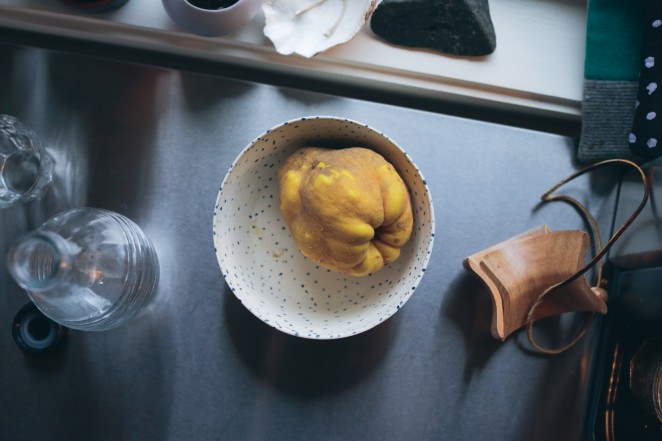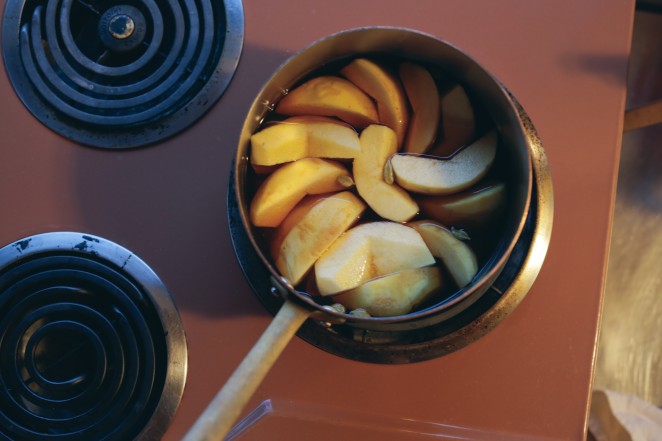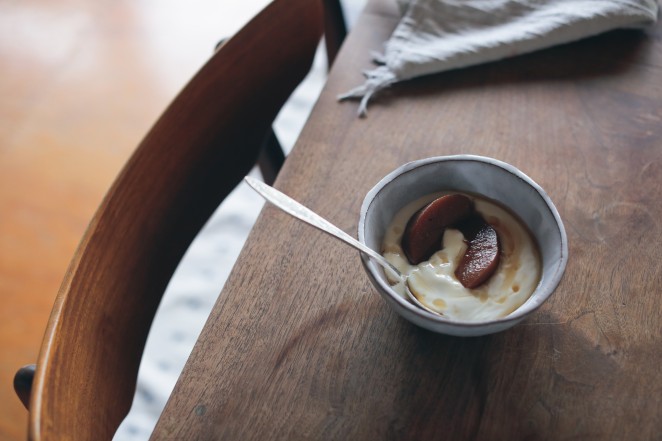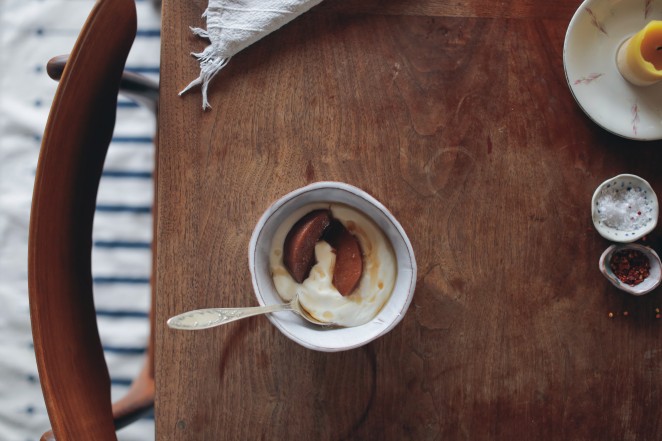Tag: a homemade life
On esoteric fruit
I first tasted quince the first time I had dinner with my first editor, an exceedingly kind, thoughtful woman of whom I nonetheless was terrified, because she was very New York Publishing World, and because she was my first editor. She had let me choose the restaurant, which only ratcheted up the stakes. I’m surprised that I don’t remember what I wore, because I surely would have labored over the decision with a degree of care most commonly seen among people handling live explosives. The evening went better than I had expected: she told a funny story about her cat and gracefully ignored my elaborate, enthusiastic mispronunciation of the white wine she’d ordered. And when we arrived at dessert, she opened the menu and beamed. “Quince!” she nearly cheered, “I’ll have the quince.”
What arrived was a martini glass – I think? though sometimes I also think my memory is garbage? – containing a scoop of housemade ice cream topped with small, pink, mathematically perfect cubes of what I now know to be poached quince, and on top of that, crumbly nubs of ginger streusel. She spooned up a bite, and as she chewed, her eyelids fluttered. Then she nudged the glass across the table to me.

Quince is an esoteric fruit, hard to find and, once you’ve found it, difficult to subdue. It’s a member of the same family as apples and pears, and it looks a lot like both, though its flesh is more dense and harder by far. It’s knobby, green when it’s not quite ripe and golden when it is, often covered in grayish-white fuzz, like a peach. It’s too hard and sour to eat raw, like raw rhubarb but worse, and it needs a long, slow cook before it will submit to being eaten. I would not write about quince if it weren’t worth the hassle. It is.
Though I will admit that I have occasionally been guilty of buying one not to eat it, but just to keep it next to the sink and sniff it. Perfume is the best word for what a ripe quince smells like, a little like cooked apples, a little like wine, a little like lemon peel, a lot like flowers. It can fill a room. It’s so potent, it’s its own caricature, a quince-scented Yankee Candle as engineered by Nature herself. As a kid, I loved the smell of gasoline and was always rolling down the window and taking deep breaths while my parents filled the tank – this no doubt explains a lot – but as a mature, responsible adult, I’ve traded the old gasoline habit for a quince on the counter, when seasonally feasible.
That said, if you can find a quince, when you’ve had enough of huffing it, I might recommend that you poach it.

There are lots of ways to eat quince: roasted, cooked down into jam or jelly or the sweet-savory paste called membrillo, grated into an apple pie, baked into a tarte Tatin, and whatnot. I keep meaning to try that tarte Tatin. But mostly, when I come across quince, I poach it. I cook it slowly on the stovetop until it softens into a pool of its own syrup and then eat it the next morning for breakfast, with whole-milk plain yogurt. And then again as a snack around eleven. And then I eat it again later in the day, for dessert, on top of ice cream or a slice of pound cake. Poached quince lasts for a good week in the refrigerator, and the longer it marinates in its poaching syrup, the prettier it gets. If you’ve cooked it in a poaching liquid sweetened with sugar, it will get redder as it sits. If your poaching liquid is sweetened with maple syrup, it’ll go a handsome ruddy brown, the color of a caramelized apple.

Poaching quince doesn’t really require a recipe, but my favorite version comes from a new-ish book called The New Sugar and Spice, by Samantha Seneviratne, who, incidentally, I met once in the summer of 2005 in our mutual friend Amy Leo’s backyard in New Jersey, though I haven’t seen her since. Hi, Sam! I love your book!

Her version is simple and well considered: nothing but water, maple syrup, salt, and six green cardamom pods, cracked open under the side of a knife. Actually, I shouldn’t lie: I was wary of using that full half-dozen pods of cardamom. The flavor of quince is so floral, I don’t like to screw with it. I doesn’t need anything. But Sam was right. Poached quince with maple and cardamom is How I Will Henceforth Do Quince: delicate, fragrant, the flavor of the fruit not covered up but boosted.
Maple-Poached Quince
Adapted from The New Sugar and Spice, by Samantha Seneviratne
In Seattle, I’ve found quince at the farmers’ market in the wintertime, and I venture to guess that Whole Foods or another fancy-ish store might have it, too. I also hear that you can sometimes find it at Asian and Middle Eastern markets.
Oh, and everyone talks about how difficult and treacherous it is to peel a quince, but as long as I use my extremely cheap-and-trusty Y-peeler, it’s no biggie. Muuuuch easier than using a knife.
In a medium saucepan, combine the maple syrup, cardamom pods, salt, and water. Whisk to combine.
Cut one of the quince into 8 wedges. Place one wedge, flat side down, on a cutting board, and use a sharp knife to cut a V-shape in the center, removing the seeds. Repeat with the remaining wedges, placing the prepared wedges in the saucepan as you go. Repeat with the second quince. (You’ll probably note, by the way, that the flesh begins to brown when it’s exposed to air, the way the flesh of an apple does; don’t worry too much, because the discoloration will disappear as the quince cooks.)
Place the saucepan over medium-high heat, and bring to a simmer. Lower the heat to maintain a gentle simmer, and cover the pan loosely with a lid, leaving a small crack for steam to escape. (Since the quince will take a while to cook, you want to keep as much moisture in the pan as possible, but you do want to let a small amount of the liquid evaporate, so that it slowly reduces a bit.) Cook gently until the quince is very tender when pierced with a knife, approximately the texture of a canned pear. This may take as little as 50 minutes or as long as 2 hours, depending on your fruit. (Seneviratne advises that you keep an eye on the pot and add more water if needed to keep the fruit submerged until it’s ready, though mine didn’t come anywhere near needing it.)
When the fruit is tender, remove it carefully from the pan to a bowl or storage container, leaving the liquid behind. Fish out the cardamom pods, and discard them. Raise the heat to medium-high and simmer the poaching liquid briskly, stirring frequently, until it has reduced to about one-third of its original volume and is thickened like syrup. Pour the syrup over the fruit, and allow to cool completely.
Serve the cooled quince in wedges or slice it thickly, and be sure to drizzle it with syrup.
Note: Stored in an airtight container, the cooked quince will keep for up to a week.
Yield: 6 servings
We’ll go from left to right

I promised cookbooks, and I shall deliver cookbooks. No more nostalgia! No more old photographs! No more zoning out with Danzig videos on YouTube because a man in a Danzig t-shirt just walked into the coffee shop where I am writing and reminded me of the song “Mother ’93“! I will be useful. Four years ago, when we moved into the house where we now live, I started keeping a small collection of cookbooks on top of the refrigerator. Most of our books live in June’s room, on the wall of shelves there, but that’s down the hall from the kitchen, and I wanted to have my most-used, best-loved, most-consulted books within reach. I rotate them as new books come…
Read moreApril 23

In the time since you and I last spoke, I’ve been to New Jersey and back for my sister-in-law’s wedding and, in the name of research, have eaten a lot of New Jersey bagels and New Jersey pizza. It was hard. And while I continue to dig my way out of the giant to-do list that accumulated in my absence, I wanted to quickly remind you: tonight, a crew of musicians is performing original music inspired by my first book A Homemade Life. 8 pm! The Royal Room! 5000 Rainier Avenue South! Seattle! Come on out! The whole concept is one of the weirdest, best things I’ve ever heard of, and I can’t wait. I baked four Winning Hearts and…
Read moreBook update, housekeeping, la la la

It is with pleasure, great relief, and even greater trepidation that I can FINALLY say that Delancey, my second book, will be published in three months and one day. Right! Three months and one day sounds like an eternity. An age. But we’re closer than we were a month ago! Look at it that way. That’s the way I look at it in my better moments, the ones when I’m not staring at the clock. In the meantime, I get to present to you the book trailer, or video, or whatever you call it, for Delancey. My publisher and the video team did a beautiful job! Granted, I am not exactly what one would call at ease in front of…
Read moreOurs now
I don’t know how this could be possible, but according to the calendar, it’s been a year since my book first came out, a whole entire year that went by in what I could swear was only 45 minutes. And today, though I do sort of want that year back, I’m happy to report that the paperback edition has just been released. It’s leaner, it’s meaner: it’s the same book, but cheaper! I dare you to say that three times fast. Over the past year, or 45 minutes, however you look at it, many of you have written to me to say that you’ve read the book, or that you’ve cooked or baked from it, and I cannot thank you…
Read moreThe feeling of it
I’m not sure what to say today. Pretty much the only thing that comes to mind is whoa. And wow. And thank you. Actually, it’s more like THANK YOU. With lots of !!!!! at the end. Just to be perfectly clear. I don’t have much to show for the past ten days, I have to admit. I took a couple of cameras on the road with me, but somehow, I only brought them out when I was in transit, in the subway or on a train, or in an airplane, half asleep between Newark and Seattle, sitting next to a window whose surface was so intricately, so elaborately, so eerily scratched-up that it looked like the thumbprint of a giant.…
Read moreWhat a kick
Hi, all. I can’t stay for long today, but I had to stop in for a minute. I just had to thank you for all of your hugely kind comments and e-mails about the book. I’m not so good at replying right now, but please know that I read every one, and that you have made my day many times over. This whole book thing feels completely crazy, really. It feels as though I’ve been given a bit part on some flashy, fancy TV show – maybe I’m a murder victim on the autopsy table on CSI: NY, let’s say – and even though I’m only on screen for 20 seconds, probably with bad makeup and a huge, gaping chest…
Read moreNow you know
I have a confession to make. It probably seems like I live and breathe to cook, right? It probably seems like I never get tired of stirring and whisking and chopping, like I go to sleep at night spooning the refrigerator and wake up each morning to find a skillet under my pillow and a rainbow arcing gently, benevolently, over the stove. But the truth is, there are many days when I would rather do anything than cook. ANYTHING. Like, hit-myself-over-the-head-with-the-aforementioned-skillet anything. Anything. Lately, I’ve been having a lot of those days. At first, I thought it was because of my recent run of bad recipes. It’s hard to feel terribly excited about spending time in the kitchen after you’ve…
Read moreThursday, Thursday, Thursday.
Hi, friends. I had the best intentions. I did. I was going to tell you about another cookie today, and a really good one too. But a visitor has been staying with us lately, and he won’t let me into the kitchen. He’s big and burly, 90,000 words tall. His name is Man U. Script, and he’s a bruiser. He’s bossy and demanding, and he makes me sit at my desk for hours and hours and hours. But the good news is that, at long last, he’s leaving on Thursday. He’s getting into a FedEx box and going to New York to hang out with my editor. I can hardly believe it. I don’t know whether to open a bottle…
Read more
